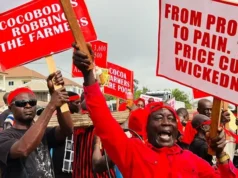The family of former Finance Minister Mr. Kenneth Ofori-Atta has accused the Office of the Special Prosecutor (OSP) of abusing its administrative powers in the ongoing matter involving its (family) kinsman.
In a press statement issued on Monday, the family demanded the withdrawal of an INTERPOL Red Notice, stating that it has initiated steps with the National Central Bureau and the Commission for the Control of INTERPOL’s Files to have it deleted.
The family’s statement outlines several grievances, including the alleged deliberate suppression and manipulation of evidence by the OSP, a violation of Mr. Ofori-Atta’s human rights—specifically, his right to health—and a disregard for judicial proceedings, thereby denying him due process. They also cite a breach of administrative justice.
According to the press release, the OSP unlawfully declared Mr. Ofori-Atta a “wanted person and fugitive from justice” through a media briefing. The family contends that the OSP may have manipulated evidence to procure an Arrest Warrant dated February 11, 2025, for “Using Public office for private profit. They further claim that the arrest warrant was obtained under “unusual circumstances,” with court records unclear on how the OSP secured it without a filed affidavit, a matter currently pending in court.
The family states that the OSP’s February declaration prompted a Human Rights Court case, in which Mr. Ofori-Atta challenged the OSP’s authority to declare him wanted via a media briefing, arguing that it was an unlawful exercise of power. This, the family asserts, led to violations of his human rights, including his liberty, freedom of movement, and right to health, which the Ghanaian Constitution and international human rights instruments protect.
Despite ongoing Human Rights Court proceedings, with a ruling scheduled for June 18, the OSP “contemptuously” repeated its declaration of Mr. Ofori-Atta as a wanted person. The family highlights that Mr. Ofori-Atta was prepared for a video-recorded interview while attending to his health abroad, to allow the OSP to take a Cautioned Statement once he is fit to return to Ghana.
The family emphasizes Mr. Ofori-Atta’s cooperation, stating he has provided all requested documents and offered to participate virtually for a Cautioned Statement. They clarified that an initial interview scheduled for February 10 was rescheduled to June 2 due to health concerns, specifically a biopsy on March 21, 2025, which revealed cancer requiring surgery on June 13, 2025, at the Mayo Clinic. However, the OSP denied his request for a video-recorded interview, insisting on his in-person attendance. The family views the OSP’s actions as a “premeditated theatrical stunt” to portray Mr. Ofori-Atta, a cancer patient scheduled for surgery, as a fugitive.
Mr. Ofori-Atta’s legal team is inquiring with the Commission for the Control of INTERPOL’s Files to determine whether the Human Rights Court suits, the scheduled June 18th hearing, Mayo Clinic doctors’ letters and reports, and the expected cancer surgery were disclosed to INTERPOL and other relevant Ghanaian ministries during the Red Notice pursuit. The family believes that non-disclosure would violate Articles 2 and 3 of INTERPOL’s constitution, which regard the right to health.
The family reiterated that Mr. Ofori-Atta has consistently demonstrated transparency and cooperation in all legal inquiries since his appointment as Minister for Finance in 2017, with all allegations against him thoroughly examined and disproven by various bodies, including CHRAJ, the ECOWAS Court of Justice, and the Parliament of Ghana. They firmly deny any claims that Mr. Ofori-Atta is fleeing justice, calling such suggestions “out of character, preposterous, and simply not true.
The press release concludes with the family expressing confidence that Mr. Ofori-Atta’s rights will be restored and he will be acquitted once the investigations are completed, following his surgery and recovery.
The family summarised the OSP’s actions as including the use of the office for vendetta and political persecution, deliberate suppression of evidence, denial of institutional flexibility, disregard for due process, breach of professional ethics, unlawful declaration as a fugitive, refusal to adhere to regulatory frameworks, and violation of human rights.










